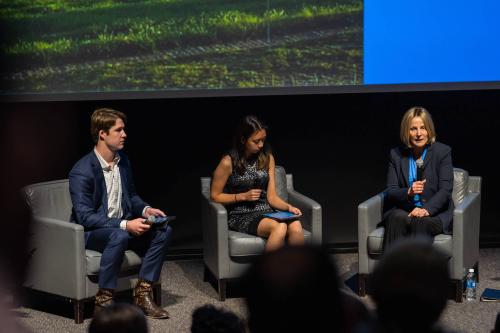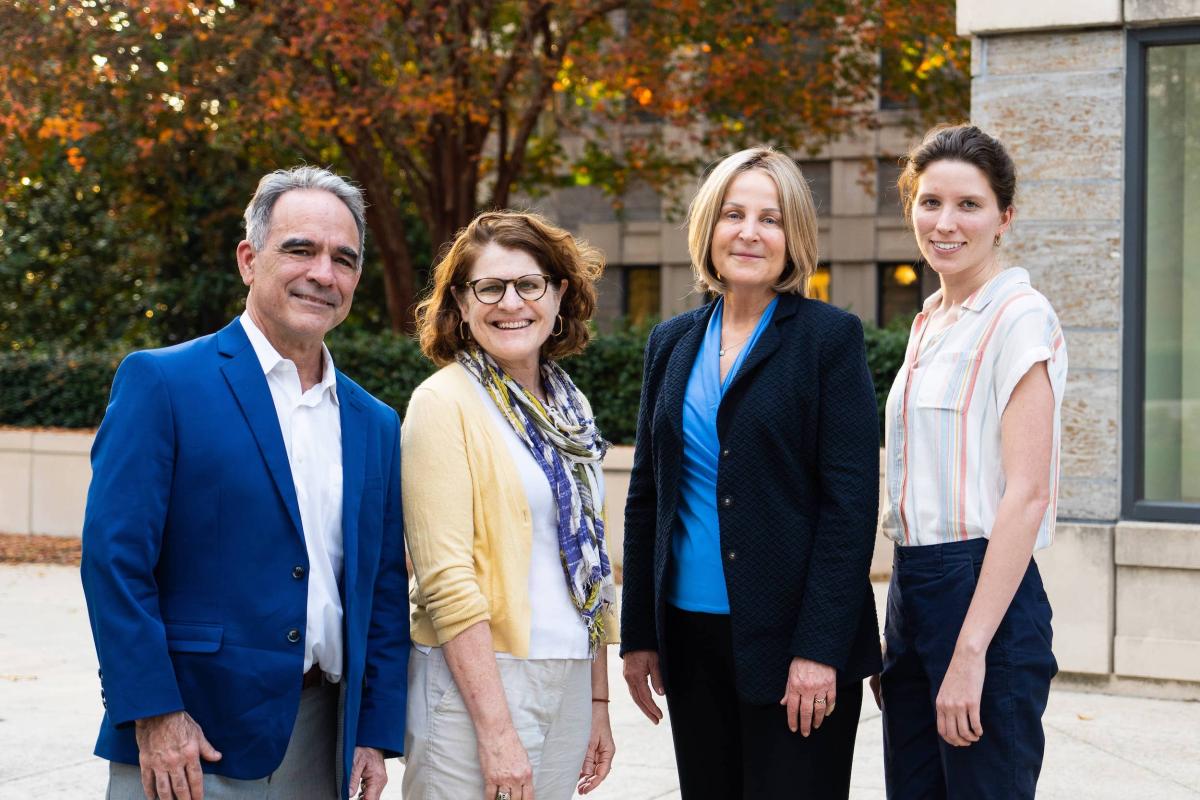
A live and online audience joined the kickoff for Energy Week at Duke University on Nov. 7 as part of the Rubenstein Distinguished Lecture, endowed by David M. Rubenstein.

Energy expert and author Alice Hill delivered her talk on “Powering a Resilient Future” on Nov. 7 at Griffith Film Theater and via livestream. The lecture was a kickoff to Energy Week at Duke – coinciding with the beginning of the 2022 United Nations Climate Change Conference (COP 27) in Egypt.
In her talk, Hill emphasized actions the audience could take to help tackle climate change – high-stakes work that she said brings her joy and purpose, despite the challenges.
“The polling shows we don’t talk about climate change. All of us need to engage and figure out actions we can each take. We can vote, and we should prioritize this as an issue to address and discuss,” Hill said.
She added: “We don’t have much time – the window is closing rapidly,” visually demonstrating in her talk the effects of climate change on our lives and conditions around the globe.
In the United States, Hill said: “Virtually all of the infrastructure that people and communities rely upon was built to survive the climate of the past – not that of the future.”
Hill shared data on power outages on the rise. “Some of the outage events have the distinct imprint of climate change. We have a lot better picture now of what is going on with data – winter storms, hurricanes, wildfire and more have caused outages,” Hill said. “These outages are affecting people’s lives.”

About Alice Hill
Hill is David M. Rubenstein Senior Fellow for Energy and the Environment at the Council on Foreign Relations, where her work focuses on risks, consequences, and responses associated with climate change. She previously served as special assistant to President Barack Obama and senior director for resilience policy on the National Security Council staff where she led the development of national policy to build resilience to catastrophic risks, including climate change and biological threats. Her co-authored book, Building a Resilient Tomorrow, was published in 2019. Hill’s new book, The Fight for Climate After COVID-19, was published in September 2021.
To get to resilience for our energy grid, Hill said, “We need reliable power. No single entity in the U.S. has sole responsibility. The federal government has a role in promoting resilience, but more needs to happen.”
Hill outlined possible steps for the future, including:
- a national plan to achieve resilience across all levels of government (local, state, federal) to reduce power outages and restore power quickly.
- mitigation and adaptation working together. Hill described an example in California of solar panels installed over canals to improve land and water use.
- innovations, including distributed solar power on rooftops to help generate power in times of outage.
A former judge, Hill said climate change is complicated and full of unknowns. As a judge, she made decisions around the rule of law. But climate change has no rulebook.
“The stakes here are not minor. We are talking about not just financial loss, but saving lives. The good news is that this is doable. Duke already recognizes the problem, through the Energy Week competition identifying solutions. Its graduates can be a part of finding our way. Climate change waits for no one. It will require the innovation of Duke graduates, and graduates across the globe. This is one of the greatest opportunities in history to create change,” Hill said.
Climate Opportunities

For students, Hill said there are opportunities for jobs. “People with knowledge will be in demand to meet this enormous challenge and design solutions for the future, not for systems of the past,” she said.
“The Sanford School is known for being a place of thinkers and doers – this is what we need right now across the globe,” Hill said.
Energy Week co-chairs and Duke students Anjali Balakrishna and Erin Kirton, shared about how high the stakes are for the future of students and people around the world. With a goal to build a more resilient world and prioritize equity in energy, the students planned an entire week of Energy Week programming. Learn more about Energy Week at Duke.
Hill's talk was the fall 2022 David M. Rubenstein Distinguished Lecture of the Sanford School of Public Policy. David M. Rubenstein is a Duke alumnus and former chair of Duke’s Board of Trustees. The David M. Rubenstein Distinguished Lecture brings high-profile thought leaders and policymakers to campus each year. Learn more about the Rubenstein Lecture Series.
Featured Video





